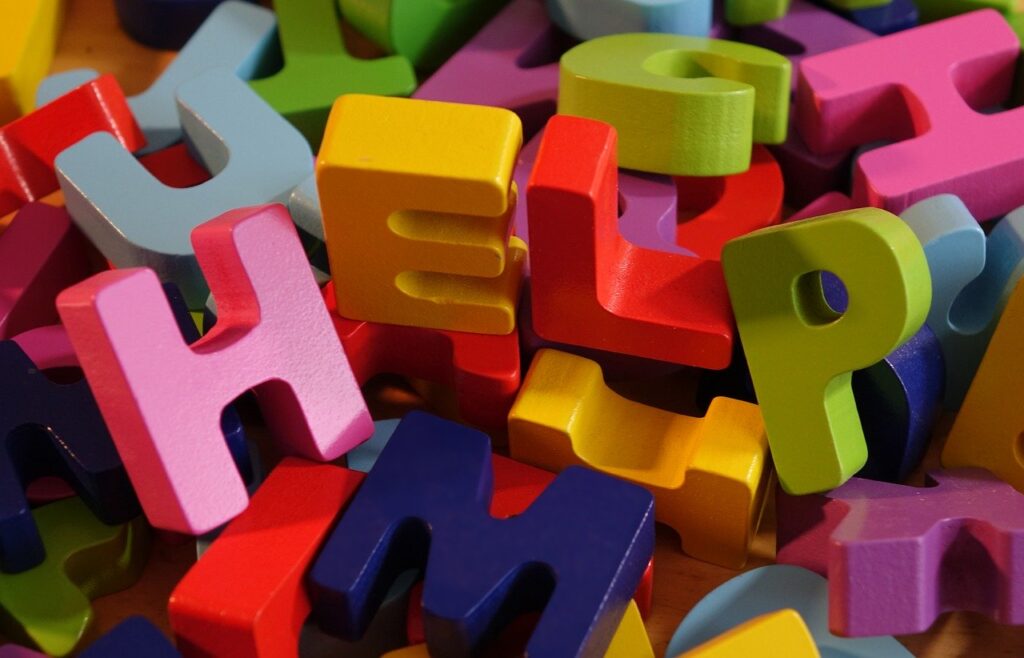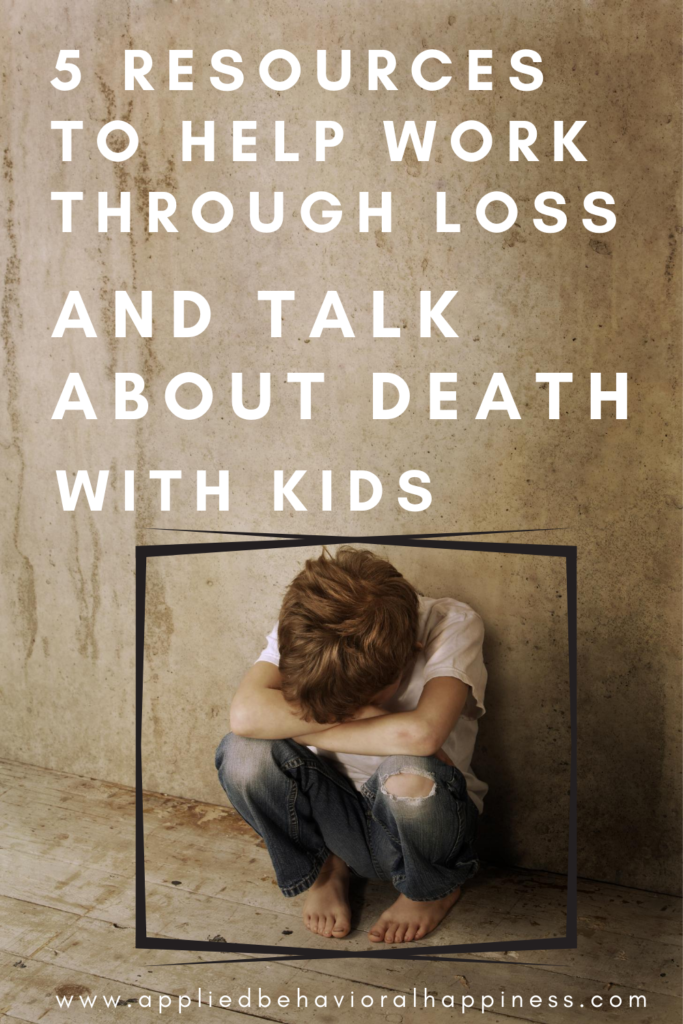It is incredibly hard to to talk about death with kids. With anyone really. Recently I have been contacted by a number of families working through a death of a close relative and through the years, I have worked with several families that lost a grandparent, friend, parent, or beloved pet during or just before our time together. Death is hard and grief can manifest itself in some interesting ways. Often, caretakers and teachers report that kids “lose” skills, revert back to old behaviors, or that a new behavior shows up that they did not expect.
I have seen kids become dependent on pull ups when they have been potty trained for years, repeatedly act out death scenes during play, be brought to tears out of no where, and try to visit a relative in heaven by attempting suicide (without full understanding of the permanence of death). Everyone reacts to loss differently, but one thing is for certain: talking about death ahead of time and having some tools in place should a loss occur will make the grieving process a little less traumatic for everyone.
Here are five tools that can help:
Important notice: this blog may contain affiliate links. If you choose to click and buy from the link, we may get a small commission. This costs you NOTHING for you and helps us offer more low-cost options. Thank you for your support!
1) If you are going to attend a funeral and your child is anxious or frightened, consider creating a schedule or story:
Consider creating a written-out story or schedule covering what is going to happen at the funeral or memorial so that they can prepare for the day. You can get more or less detailed depending on what will bring more relief to your child. For example, some kids may feel more secure if they have a simple schedule like:
· Drive to beach
· Everyone gets a turn to talk about Mommy
· Sprinkle ashes in the ocean and say goodbye
Others may feel more comfortable if they are given a detailed plan (with or without visuals) for the day that references possible points of high emotion like:
On Thursday, I am going to a funeral for Grammie. We miss Grammie and the funeral is a celebration of how wonderful she was. In the morning, we are going to eat breakfast at the hotel and then everyone will dress up in black. We will drive to the church in Aunt’s car. At the church, we will sing and listen to people talk about Grammie. Daddy is going to talk about Grammie and may feel sad. When people feel sad, they sometimes cry. When he is done talking, we are going to walk to the grave site…
Also, consider adding in break times or ways that they can ask to move away from the area if they are overwhelmed. For example, you can create a code for “I need to leave this area and take a break” so that your child can signal you if needed. A hand squeeze or a number of taps is often a good cue because it is both clear and quiet (and easy to remember).
2) If your child is spiraling into panic about losing others, try adding a sensory experience to help break the cycle:
When you see a child start to go into a spiral of thinking, give them something that will create a sensory reaction to help them ground themselves again. Some people suck on an ice cube, smell or taste something strong (everything from lavender to mint to wasabi), or feel something a bit prickly (like rolling a nubby ball on their arm).
Do note that this should be a fairly pleasant sensory experience; I wouldn’t offer cinnamon gum unless I knew that was a flavor the child enjoyed and could handle.

When everything is calm and they feel safe, you can teach them to reach for support items and to use coping behaviors to help them self-regulate.
Worried about the funeral itself? Bring them some quiet sensory items to help them self-regulate such as: a stretchy or squishy toy, a lavender pillow, or a chilled or warmed hot/cold pack (the type filled with blue goo).
3) Look into grief and loss children’s books for support:
Wherever You Are My Love Will Find You by Nancy Tillman is one you may consider as it does not mention death but rather focuses on how love connections last through any distance.
Here are seven such books that you could consider adding to your library as tools to help your child work through grief and understand death. There are many, many more that you can find on Amazon (like the one linked here, to the right) or at your local book store.
Do note: some books are focused on preparing for a loss while others are aimed at helping work through loss. Make sure that the book you are purchasing fits your current needs.
You might consider an interactive book like this one, available on Amazon (click here to check it out.)
4) Reach out to local professionals in the field of grief:
Amber Stanley, MSW, LCSW is a loss and transitions coach and a psychotherapist to patients in North Carolina and Florida (check out her website here). She suggested connecting with Transitions LifeCare for tips and tricks on helping kids work through grief.
I found this article on helping kids transition back to school after a death has occurred to be particularly impactful. As well, Transitions LifeCare offers support groups for kids of different ages to help work through the grief process (scroll to the bottom of the article to see info on these).

5) Prepare yourself for if your child begins to “use” the death in unexpected ways:

One thing that I have seen many times is a child referring to the loss when they are trying to achieve something. I want to be very clear: this does not make them bad, they are probably not trying to hurt you, and it does not mean that they lack a moral compass. Let’s start with an example, then we can talk details.
Imagine a child wants an ice cream and a caregiver says no, perhaps because it’s 7am and they just gave them their breakfast. Here are a few things that I have heard children say after hearing no if they have recently experienced the loss of someone close to them:
- “I miss [person] so much and I thought that the ice cream would make me feel better”
- “Can we have [person]’s favorite flavor to help remember them?”
- “I hate you! [Person] would have let me have it! I wish you died instead of them!”
Again, none of these make them bad or mean that they lack empathy. Emotions are really hard to work through and coping with loss gracefully is a very difficult skill to master.
The first two examples could be very genuine responses wherein a child is expressing that they are attempting to use ice cream as a coping mechanism or a way to memorialize the person in this moment. That’s very deep insight! As well, they could have realized that bringing up the death is awkward for adults and they can get anything they want by doing so (most people will do almost anything to get out of an awkward situation). Neither of these reasons makes them a bad kid. Also, it’s okay to eat ice cream at 7am (no judgement here!), but if that’s not what you want to do, you could consider saying something like:
- “I miss them too. Tell you what, we can’t have ice cream right now, but can have a Popsicle after dinner tonight. How else can we help you feel better right now?”
- “Ice cream is wonderful and it makes me feel a little better too. I wish it was time to eat ice cream but it’s not. Would you like to draw the perfect Ice Cream Sunday with me? Mine would have unicorn sprinkles on it!”
- “Ice cream for breakfast sounds like fun, but we already have breakfast ready for today. We can do ice cream breakfast tomorrow. Let’s talk about other fun things like…fluffy birdies eating big fat worms! I think [person who passed] would have found that funny too. What’s something else fun we could talk about?”
The last example with its many charged words (hate, wish you died) may seem like they are just being mean and hurtful. Instead, it could be that the loss of the ice cream is compounded on the loss of the loved one which makes the situation unbearable.
Think of it like the straw that broke the camel’s back: normally not being able to get something may not really affect them but because this loss is stacked on top of the death, it feels absolutely overwhelming. And what do we often do when we are not capable of processing a moment and feel attacked? Fly, fight, or freeze. In this case what came out was fight.

It’s okay to feel betrayed in these moments or sad or mad or at a loss. Know that there is support out there for you and for your child so that this behavior is a blip and not a long-term pattern. While we can understand where these behaviors come from and empathize with the child, we can also help them find better ways to express their feelings and needs.
In conclusion
Death is a very hard thing to understand and work through, especially for kids. Know that there are resources out there to help you. If you don’t know where to start, contact us; if we don’t have what you need we will help connect you with any resource we can.
I want to send a big thank you to Amber Stanley, MSW, LCSW for her expertise and input in this blog post, as well as her commitment to helping people who are experiencing transitions and loss.
We would love to send you some more free tips, tricks, and resources once a week. Sign up now!


This is a remarkable post by the way. I am going to go ahead and bookmark this post for my sis to check out later on tomorrow. Keep up the good quality work.
I am so glad to hear that this was helpful to you! Let me know if there is anything else you would like for us to write on.
I adore this web page but I cannot actually download this images. Im just using a mobile computer if it can help. Well cheers.
Hello! The images are not available for download, but you are welcome to share them to social media by clicking the FB, Insta, or Pinterest icon at left.
Just a fast hello and also to thank you for discussing your ideas on this web page. I wound up inside your weblog right after researching physical fitness connected issues on Yahoo guess I lost track of what I had been performing! Anyway I’ll be back as soon as again inside the long run to test out your blogposts down the road. Thanks!
We are so glad you enjoyed it!
Could you please tell me which blog template did you set ? It looks very good
That’s very kind! I do not use a template for blogs.
I love your writing style genuinely enjoying this internet site. Chrystal Elvyn Celestina
Chrystal, thank you!
Wonderful post! Youve made some very astute observations and I am thankful for the the effort you have put into your writing. Its clear that you know what you are talking about. I am looking forward to reading more of your sites content.
We are lucky to have wonderful experts around us to collaborate with!
Your web site is very much worthy of a bookmark. Thank you for the good post!
Thank you, glad you’re enjoying it!
A place for everything and everything in its place
Pretty good post. I just stumbled upon your web publication and wanted to say that I have in reality enjoyed reading your blog posts. Any way I’ll be subscribing to your feed and I hope you post again soon.
Glad you like it!
Aweseme points. I used to spend alot of my time boating and being involved in games. It was quite possible the best sequence of my childhood and your post kind of reminded us of that. Cheers
Pingback: When grief and the holidays mix: The best books and tools for kids -
Pingback: When grief and the holidays mix: The best gifts for helping kids with grief and to teach about death -